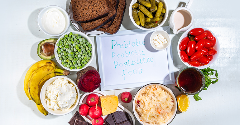News
Harnessing oat hulls to make sustainable sweeteners
30 Jun 2022
Finnish company Fazer is transforming the oat hull side streams from its existing oat mill into the low-calorie sweetener, xylitol.
The Finland-headquartered bakery, confectionery, non-dairy and plant-based foods manufacturer recently began production on the world’s first xylitol made from oat hulls.

“The Fazer xylitol production method utilises the side stream of our existing oat mill in Lahti so we do not need to purchase raw material on the open market,” James Dedman, vice president of Fazer Foodtech explained.
“This method and raw material are unique in the global xylitol production world,” he said, adding that the remaining oat hull waste after the xylitol has been produced is also used to produce energy in the form of steam power.
The resulting energy will power the xylitol production plant and, at full capacity, will provide the steam for the Fazer crispbread factory and the mill overall, said Dedman.
This zero-waste approach “sets Fazer Xylitol apart from other suppliers, and makes us unique in our sustainability approach,” he said. The sustainable production process was developed despite the fact that production of the sugar xylose – the raw material for xylitol production – is difficult to develop on an industrial scale across the board, Dedman added.
Consumer demand for sustainability & price competitiveness
Ingredients Network asked Dedman whether there are cost implications for this kind of sustainable production. Although the company does “not discuss cost position externally,” he told us that: “Fazer xylitol will be competitive in the global market and we will be the only supplier that can produce all of the three specific grades (crystalline, milled and granulated) at the same factory.”
Nevertheless, Fazer has research showing that sustainable products are preferred by consumers, “especially in northern Europe,” said Dedman, adding: “There is a willingness to pay more for these types of products.”
It is vital to continue driving consumer understanding and convince them of the benefits of sustainably produced ingredients, Dedman added.
Importance of sustainability in food production
Dedman went on to highlight the importance of sustainability as a driving force of Fazer’s company ethos. In the last three years, Fazer has invested €300 million in oats derivatives, the most significant investment of which is the Fazer Xylitol factory.
“At Fazer we take sustainability extremely seriously, and no new product or ingredient developments are undertaken without meeting our sustainability guidelines and goals,” he said.
In its press statement, Fazer marked the new xylitol production line as an “excellent example of modern circular economy innovation,” a term used to describe production which reuses and recycles materials and equipment as much as possible to avoid waste.
“The factory’s environmental footprint is very small, I believe that we could talk about the world’s most sustainable xylitol,” Christoph Vitzthum, president and CEO of Fazer Group said in the press statement.<.p>
Nordic oats go international
According to Fazer, the international demand for Finnish xylitol is expected to increase in future, “due to its many application opportunities in the food, cosmetics and pharmaceutical industries.”
The company claims that Nordic oats have an “unparalleled reputation internationally” and are known to be “pure and of very high quality,” while Finnish food and technology expertise is “at a very high level.”
Dedman said many large companies likely also share Fazer’s sustainable vision and goals, and would therefore “be willing to challenge existing ingredients or products with a more sustainable alternative.”
The company added that 90% of its new Fazer xylitol product is earmarked for export, and is of “special interest” in Europe, the US and Asia, according to Vitzthum.
Beside producing xylitol as a raw material, the Lahti factory’s patented manufacturing technology can also be licensed to other companies.
Related news

Oat Barista: Innovation for game-changing beverages
20 Nov 2025
Oat Barista is a clean label, sustainable, and innovative drink base specifically designed to create the perfect foam in one single ingredient.
Read more
Nitrites: Pressure grows on UK to follow EU’s lead
20 Nov 2025
Pressure is growing on the UK to follow the EU’s lead after the bloc revised its regulations on the permitted levels of nitrites and nitrates in cured meats.
Read more
Empowering innovation in fortification and colouration
13 Nov 2025
Divi’s Nutraceuticals offers a large portfolio of innovative, high-quality ingredients for foods, beverages, and supplements, with bespoke solutions and expert support for product success.
Read more
Danone highlights digestive health as potential ‘tipping point’ for food industry
13 Nov 2025
Danone is betting on a food industry “tipping point” that will bloat the market for healthy products, particularly those related to gut health.
Read more
Standing Ovation and Bel scale up casein production from dairy co-products
11 Nov 2025
Foodtech company Standing Ovation has partnered with cheese specialist Bel Group to manufacture dairy serums for industrial-scale casein production via precision fermentation.
Read more
AI attraction means foodtech startups must ‘prove’ rather than ‘promise’
4 Nov 2025
Reports suggest that artificial intelligence (AI) is sucking investment from foodtech and agritech, but investors say the picture is complicated.
Read more
Will postbiotics become the go-to functional ingredient?
3 Nov 2025
Postbiotics show significant promise for the functional foods market due to their safety profile and beneficial bioactive properties, research suggests.
Read more
Meet the finalists of the Fi Europe Innovation Awards 2025
31 Oct 2025
Who made it to the shortlist of the Fi Europe Innovation Awards 2025? Read about the 23 companies making food and drink products healthier and manufacturing processes more efficient.
Read more
Penguin and Club bars no longer classed as chocolate
30 Oct 2025
Penguin and Club bars can no longer be classified as chocolate after the pladis-owned McVitie’s brands turned to cheaper alternatives amid the ongoing cocoa crisis.
Read more
Shorter drying time, sweeter success!
30 Oct 2025
Curious about cost-effective, sustainable and delicious candy making? Stefan Wessel reveals how Avebe’s solutions reduce drying time and energy use by up to 50%.
Read more